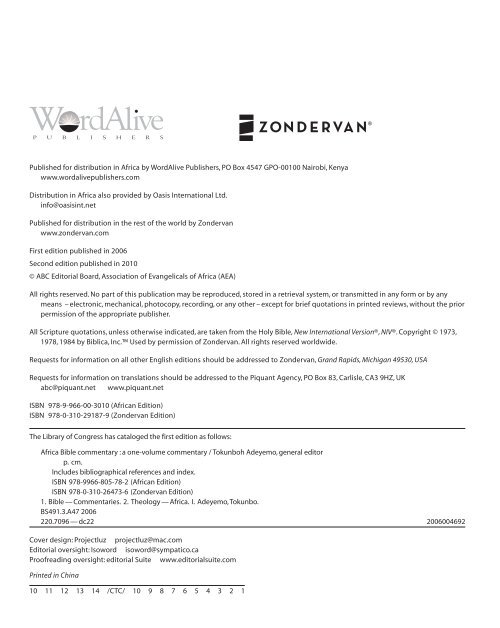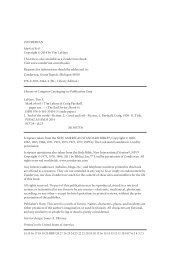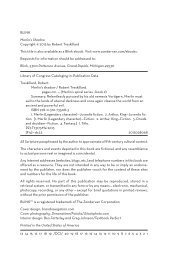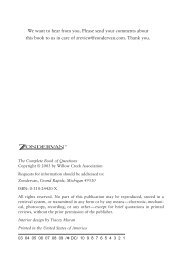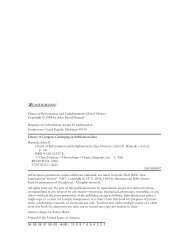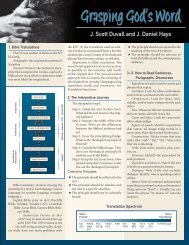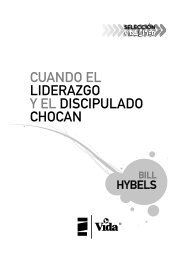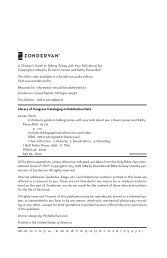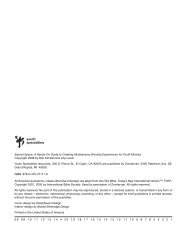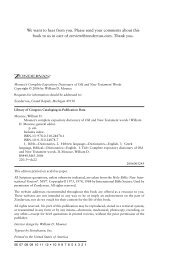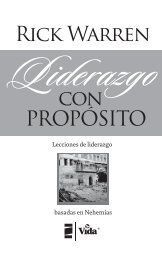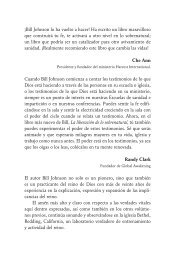Published for distribution in Africa by WordAlive Publishers, PO Box ...
Published for distribution in Africa by WordAlive Publishers, PO Box ...
Published for distribution in Africa by WordAlive Publishers, PO Box ...
You also want an ePaper? Increase the reach of your titles
YUMPU automatically turns print PDFs into web optimized ePapers that Google loves.
<strong>Published</strong> <strong>for</strong> <strong>distribution</strong> <strong>in</strong> <strong>Africa</strong> <strong>by</strong> <strong>WordAlive</strong> <strong>Publishers</strong>, <strong>PO</strong> <strong>Box</strong> 4547 G<strong>PO</strong>-00100 Nairobi, Kenyawww.wordalivepublishers.comDistribution <strong>in</strong> <strong>Africa</strong> also provided <strong>by</strong> Oasis International Ltd.<strong>in</strong>fo@oasis<strong>in</strong>t.net<strong>Published</strong> <strong>for</strong> <strong>distribution</strong> <strong>in</strong> the rest of the world <strong>by</strong> Zondervanwww.zondervan.comFirst edition published <strong>in</strong> 2006Second edition published <strong>in</strong> 2010© ABC Editorial Board, Association of Evangelicals of <strong>Africa</strong> (AEA)All rights reserved. No part of this publication may be reproduced, stored <strong>in</strong> a retrieval system, or transmitted <strong>in</strong> any <strong>for</strong>m or <strong>by</strong> anymeans – electronic, mechanical, photocopy, record<strong>in</strong>g, or any other – except <strong>for</strong> brief quotations <strong>in</strong> pr<strong>in</strong>ted reviews, without the priorpermission of the appropriate publisher.All Scripture quotations, unless otherwise <strong>in</strong>dicated, are taken from the Holy Bible, New International Version®, NIV®. Copyright © 1973,1978, 1984 <strong>by</strong> Biblica, Inc. Used <strong>by</strong> permission of Zondervan. All rights reserved worldwide.Requests <strong>for</strong> <strong>in</strong><strong>for</strong>mation on all other English editions should be addressed to Zondervan, Grand Rapids, Michigan 49530, USARequests <strong>for</strong> <strong>in</strong><strong>for</strong>mation on translations should be addressed to the Piquant Agency, <strong>PO</strong> <strong>Box</strong> 83, Carlisle, CA3 9HZ, UKabc@piquant.net www.piquant.netISBN 978-9-966-00-3010 (<strong>Africa</strong>n Edition)ISBN 978-0-310-29187-9 (Zondervan Edition)The Library of Congress has cataloged the first edition as follows:<strong>Africa</strong> Bible commentary : a one-volume commentary / Tokunboh Adeyemo, general editorp. cm.Includes bibliographical references and <strong>in</strong>dex.ISBN 978-9966-805-78-2 (<strong>Africa</strong>n Edition)ISBN 978-0-310-26473-6 (Zondervan Edition)1. Bible — Commentaries. 2. Theology — <strong>Africa</strong>. I. Adeyemo, Tokunbo.BS491.3.A47 2006220.7096 — dc22 2006004692Cover design: Projectluz projectluz@mac.comEditorial oversight: Isoword isoword@sympatico.caProofread<strong>in</strong>g oversight: editorial Suite www.editorialsuite.comPr<strong>in</strong>ted <strong>in</strong> Ch<strong>in</strong>a10 11 12 13 14 /CTC/ 10 9 8 7 6 5 4 3 2 1
CONTENTSForeword <strong>by</strong> Dr John StottForeword <strong>by</strong> Dr Robert K. Aboagye-MensahGeneral IntroductionGuidel<strong>in</strong>es <strong>for</strong> Us<strong>in</strong>g the ABCAbbreviationsContributorsCOMMENTARIESviiviiviiixixiixiiScripture as the Interpreter of Culture and TraditionKwame Bediako 3The Old TestamentIntroduction to the Pentateuch Abel Ndjerareou 7Genesis Barnabe Assohoto, Samuel Ngewa 9Exodus Abel Ndjerareou 85Leviticus Felix Ch<strong>in</strong>gota 129Numbers Anastasia Boniface-Malle 169DeuteronomyLuciano C. Chianeque, Samuel Ngewa 209Joshua David Og<strong>in</strong>de 255Judges Tokunboh Adeyemo 295Ruth Isabel Apawo Phiri 3191 and 2 Samuel Gbile Akanni, Nupanga Weanzana 3251 and 2 K<strong>in</strong>gs Musa Gotom 4091 and 2 Chronicles Nupanga Weanzana 467Ezra Nupanga Weanzana 531Nehemiah Nupanga Weanzana 543Esther Lois Semenye 559Introduction to the Wisdom LiteratureTewoldemedh<strong>in</strong> Habtu 569Job Tewoldemedh<strong>in</strong> Habtu 571PsalmsNupanga Weanzana, Samuel Ngewa,Tewoldemedh<strong>in</strong> Habtu, Zamani Kafang 605Proverbs Tewoldemedh<strong>in</strong> Habtu 773Ecclesiastes Tewoldemedh<strong>in</strong> Habtu 813Song of Songs Tewoldemedh<strong>in</strong> Habtu 823Introduction to the Prophets Yoilah Yilpet 831Isaiah Edouard Kitoko Nsiku 835Jeremiah Issiaka Coulibaly 879Lamentations Issiaka Coulibaly 951Ezekiel Tewoldemedh<strong>in</strong> Habtu 959Daniel Tokunboh Adeyemo 1015Hosea Douglas Carew 1039Joel Yoilah Yilpet 1053Amos Daniel Bitrus 1059Obadiah August<strong>in</strong>e Musopole 1067Jonah Cossi August<strong>in</strong> Ahoga 1071Micah Yoilah Yilpet 1075Nahum Cossi August<strong>in</strong> Ahoga 1085Habakkuk Youssouf Dembele 1089Zephaniah Yoilah Yilpet 1093Haggai Yoilah Yilpet 1099Zechariah Yoilah Yilpet 1103Malachi Yoilah Yilpet 1119Intertestamental Period Samuel Ngewa 1125The New TestamentPr<strong>in</strong>ciples of Interpretation Samuel Ngewa 1127Matthew Joe Kapolyo 1131Mark Victor Babajide Cole 1197Luke Paul John Isaak 1229John Samuel Ngewa 1277Acts of the Apostles Paul Mumo Kisau 1323Romans David M. Kasali 13751 Cor<strong>in</strong>thians Dachollom Datiri 14032 Cor<strong>in</strong>thians Issiaka Coulibaly 1425Galatians Samuel Ngewa 1439Ephesians Yusufu Turaki 1451Philippians Eshetu Abate 1465Colossians Solomon Andria 14751 Thessalonians Rosalie Koudougueret 14852 Thessalonians Rosalie Koudougueret 14911 Timothy Solomon Andria 14952 Timothy Solomon Andria 1503Titus Solomon Andria 1509Philemon Soro Soungalo 1513Hebrews Tesfaye Kassa 1515James Solomon Andria 15351 Peter Sicily Mbura Muriithi 15432 Peter Tokunboh Adeyemo 15511 John Samuel Ngewa 15552 John Samuel Ngewa 15633 John Samuel Ngewa 1564Jude Tokunboh Adeyemo 1565Revelation Onesimus Ngundu 1569
GENESISGenesis is a book about ‘beg<strong>in</strong>n<strong>in</strong>gs’. It tells of suchth<strong>in</strong>gs as the beg<strong>in</strong>n<strong>in</strong>gs of creation, of languages andof a chosen nation. It also gives us an account of thegenerations be<strong>for</strong>e and after the flood, together withspecific details about l<strong>in</strong>eage (5:1-32; 10:1-32). In factthe phrase ‘this is the account of’, which occurs at keypo<strong>in</strong>ts <strong>in</strong> the book, could literally be translated ‘these arethe generations of’ (2:4; 5:1; 6:9; 10:1; 11:10; 11:27;25:12, 19; 36:1; 37:2).Genesis can also be described as a book about relationships.It shows us relationships such as those betweenAdam and Eve, Ca<strong>in</strong> and Abel, Seth’s descendants andthose of Ca<strong>in</strong>, Abraham and Lot, Sarah and Hagar, Jacoband Esau, and Joseph and his brothers.But above all, Genesis is a book about God: creat<strong>in</strong>g(all th<strong>in</strong>gs), sav<strong>in</strong>g (Noah, his family, and certa<strong>in</strong> animalsand birds), destroy<strong>in</strong>g (with water <strong>in</strong> Noah’s time, withfire at Sodom and Gomorrah), choos<strong>in</strong>g (Abraham), mak<strong>in</strong>gcovenants (with Noah and with Abraham), <strong>for</strong>giv<strong>in</strong>g(Jacob) and protect<strong>in</strong>g (Joseph).Genesis and the four books that follow it (Exodus,Leviticus, Numbers and Deuteronomy) are traditionallyviewed as a unit known as the Pentateuch. They are allthought to have been written <strong>by</strong> Moses. Moses was probablyborn about 1500 BC, and lived <strong>for</strong> 120 years (Deut34:7). For the first <strong>for</strong>ty years of his life, he enjoyed thestatus of Pharaoh’s adopted grandson (Exod 2:11; Acts7:23). The Pentateuch was probably written dur<strong>in</strong>g his lasteighty years, <strong>for</strong>ty of which were spent car<strong>in</strong>g <strong>for</strong> Jethro’sflock <strong>in</strong> Midian and <strong>in</strong> God’s providence, familiariz<strong>in</strong>g himselfwith that area (Acts 7:30), and <strong>for</strong>ty of which werespent lead<strong>in</strong>g the people of Israel.Some scholars suggest that the five books were produced<strong>by</strong> many writers over many years, with the bulkof the writ<strong>in</strong>g hav<strong>in</strong>g been done between approximately850 BC and 550 BC, and that they were not all put togetheruntil as late as the fifth century BC. However, none of thearguments <strong>for</strong> this view (<strong>for</strong> example, the use of differentnames of God <strong>in</strong> different sections) have been strongenough to overthrow the traditional position that Moseswrote the Pentateuch. This commentary thus assumesMoses to be the writer.The book falls <strong>in</strong>to two ma<strong>in</strong> sections: God’s deal<strong>in</strong>gwith humans <strong>in</strong> general (1:1-11:9) and his deal<strong>in</strong>gwith those he has chosen to be his special people(11:10-50:26).Outl<strong>in</strong>e of Contents1:1-11:9 God and Humank<strong>in</strong>d1:1-31 Creation of All Th<strong>in</strong>gs2:1-3 God’s Rest2:4-25 Creation of the Human Community3:1-24 Disobedience of the First Couple3:1-6 A flaw <strong>in</strong> the community3:7-19 A new reality3:20-24 Immediate consequences of the fall4:1-16 Evil Between Brothers: Ca<strong>in</strong> and Abel4:17-5:32 The First Genealogies4:17-24 The l<strong>in</strong>e of Ca<strong>in</strong>: Multiplication of evil4:25-26 The l<strong>in</strong>e of Seth: Abel’s replacement5:1-32 Family tree from Adam to Noah6:1-8:22 The Flood6:1-7, 11-13 The cause of the flood6:8-10, 14-18 An exception6:19-7:5 The goal of the flood7:6-24 The nature and effect of the flood8:1-19 God f<strong>in</strong>ishes the operation8:20-22 Noah’s worship and God’s commitment9:1-17 God’s Covenant with Noah9:18-29 Noah’s Failure10:1-32 Repopulation of the Earth10:1 Introduction10:2-5 The descendants of Japheth10:6-20 The descendants of Ham10:21-32 The descendants of Shem11:1-9 The Tower of Babel11:10-25:18 Abraham and His Descendants11:10-26 Abram’s Ancestors11:27-32 The Move from Ur to Haran12:1-9 Abram Obeys the Lord’s Call12:10-20 The Lord Strikes Pharaoh13:1-4 Abram Returns from Egypt13:5-18 Abram and Lot Separate13:5-13 Abram protects family ties13:14-18 The Lord reassures Abram14:1-16 Abram Intervenes on Behalf of Lot14:17-24 K<strong>in</strong>gs’ Responses to Abram15:1-21 God Reassures Abram16:1-16 Sarai’s Solution to Childlessness17:1-27 The Lord’s Promises18:1-15 Abraham Enterta<strong>in</strong>s Three Visitors
10Genesis 1:1–218:16-33 Abraham Pleads <strong>for</strong> Lot19:1-29 The Destruction of Sodom and Gomorrah19:30-38 Lot and His Daughters20:1-18 Abraham and Abimelech21:1-7 Isaac, the Promised Son21:8-21 Hagar and Ishmael21:22-34 The Treaty with Abimelech22:1-19 Another Test of Faith22:20-24 Nahor’s Descendants23:1-20 Death and Burial of Sarah24:1-67 Isaac’s Marriage25:1-11 Abraham’s Death25:12-18 Ishmael’s Descendants25:19-28:9 Isaac25:19-34 Two Sons: Jacob and Esau26:1-33 Isaac and the Philist<strong>in</strong>es26:34-35 Esau’s Marriage27:1-29 Esau’s Bless<strong>in</strong>g Given to Jacob27:30-40 Esau’s Despair27:41-28:5 Jacob Flees to Haran28:6-9 Esau Learns a Lesson28:10-36:43 Jacob28:10-22 The Lord Meets Jacob29:1-14a Jacob Reaches Paddan Aram29:14b-30 Jacob Marries His Two Cous<strong>in</strong>s29:31-30:24 Life <strong>in</strong> Jacob’s Family29:31-35 Jacob’s children from Leah30:1-8 Jacob’s children from Bilhah30:9-13 Jacob’s children from Zilpah30:14-21 More children from Leah30:22-24 Jacob’s children from Rachel30:25-43 Jacob Blessed with Flocks31:1-21 Jacob Leaves Without Tell<strong>in</strong>g Laban31:22-32:2 The Lord Protects Jacob from Laban32:3-21 The Lord Protects Jacob from Esau32:22-32 The Lord Changes Jacob’s Name33:1-17 The Meet<strong>in</strong>g with Esau33:18-34:31 D<strong>in</strong>ah Dishonoured35:1-15 Jacob Returns to Bethel35:16-29 Rachel and Isaac Die36:1-43 The Descendants of Esau37:1-50:26 Joseph37:1-11 Joseph and His Dreams37:12-36 Joseph Sold <strong>by</strong> His Brothers38:1-30 Judah’s S<strong>in</strong>39:1-23 Joseph’s Victory over Temptation40:1-23 Pharaoh’s Two Officials41:1-40 Pharaoh’s Dreams41:41-57 Joseph <strong>in</strong> Charge of Egypt42:1-38 Joseph Meets His Brothers43:1-15 Joseph’s Brothers Return to Egypt43:16-45:15 Joseph Reveals Himself43:16-34 A meal together44:1-34 Benjam<strong>in</strong> and the silver cup45:1-15 Joseph’s revelation45:16-28 Pharaoh’s Support46:1-47:12 Jacob Moves to Egypt46:1-4 Jacob’s time with God46:5-27 Jacob’s company46:28-30 Jacob meets Joseph46:31-47:12 Pharaoh’s welcome47:13-26 Joseph’s Strategy <strong>for</strong> the Future47:27-49:28 Jacob’s F<strong>in</strong>al Years47:27-28 Jacob’s circumstances47:29-31 Jacob plans <strong>for</strong> his burial48:1-22 Jacob blesses Manasseh and Ephraim49:1-28 Jacob blesses his sons49:29-50:14 Jacob’s Death50:15-26 Joseph’s Life after Jacob’s Death50:15-21 Joseph’s reassurance to his brothers50:22-26 Joseph’s deathCOMMENTARY1:1-11:9 God and Humank<strong>in</strong>d1:1-31 Creation of All Th<strong>in</strong>gsThe account of God’s creation of the world establishes twokey po<strong>in</strong>ts that apply throughout this book and throughoutthe Bible. The first is that God was uniquely <strong>in</strong>volved <strong>in</strong> theorig<strong>in</strong> of the earth and the sky. They do not exist <strong>by</strong> themselvesand are not the result of impersonal <strong>for</strong>ces or otherspiritual be<strong>in</strong>gs. The second is that because the world isGod’s creation, it reveals him and is subject to his will.The first verse of Genesis can be read as a summarystatement that God created everyth<strong>in</strong>g – the heavens and theearth and everyth<strong>in</strong>g <strong>in</strong> them (1:1). The rest of the chapteris then seen as an expansion on this summary. However, itis also possible that these words outl<strong>in</strong>e the first step <strong>in</strong>creation, with the words, <strong>in</strong> the beg<strong>in</strong>n<strong>in</strong>g be<strong>in</strong>g equivalentto ‘first’. The idea then would be that the first th<strong>in</strong>g God didwas to create the raw shell (heaven and earth), and then<strong>for</strong> six days he filled that shell with content. He did not createthe whole universe as a f<strong>in</strong>ished product <strong>in</strong> one grandgesture, but worked to create it. This second view fits withthe description of the earth as <strong>for</strong>mless and empty and ofdarkness over the surface of the deep (1:2). The Spirit of Godhovered over the waters to keep them under control until
Genesis 1:3–3111they could be assigned to their place. He was controll<strong>in</strong>gthe creation project, with the result that all creation takesplace under God’s watchful eye and results from his power.This account of the creation <strong>in</strong> six days (whether takenliterally as twenty-four hour days or figuratively as represent<strong>in</strong>glong periods of time) reveals a methodical God whocreated different th<strong>in</strong>gs one after another with precise purpose.One <strong>by</strong> one the Lord puts <strong>in</strong> place all the elementsnecessary to susta<strong>in</strong> the human be<strong>in</strong>gs <strong>for</strong> whom he is creat<strong>in</strong>gthis world.As we read this account, we should note that each newstage <strong>in</strong> God’s work beg<strong>in</strong>s with his some <strong>for</strong>m of his creativewords, let there be (1:3, 6, 9, 14, 20, 24, 26). At the endof each of his creative utterances, there is some <strong>for</strong>m of thestatement, and it was so (1:7, 9, 11, 15, 24, 30). No matterwhat God ordered to come <strong>in</strong>to be<strong>in</strong>g, gather or separate,it came to be. He has the power to create and the powerto order his creation. We can rely on this same power <strong>in</strong>our circumstances. The God of creation is still the God ofhistory. If we listen to his word and submit our plans to hiswill, he can speak to raise <strong>Africa</strong> to great heights!The first th<strong>in</strong>g that God created out of the raw materialof the universe was light (1:3-5). It was created be<strong>for</strong>e everyth<strong>in</strong>gelse because it would be essential <strong>for</strong> the survivalof future plants, animals and human be<strong>in</strong>gs. Though theheavenly bodies were not yet created, the light permittedthe Creator to give <strong>in</strong>itial temporal structure to his creation:day and night, even<strong>in</strong>g and morn<strong>in</strong>g.Dur<strong>in</strong>g the second phase of his creation, cover<strong>in</strong>g daystwo to four, God provided the material framework to susta<strong>in</strong>liv<strong>in</strong>g be<strong>in</strong>gs. He created the sky (1:6-8), followed <strong>by</strong> seaand dry land (1:9). The dry land would be the ma<strong>in</strong> arena<strong>for</strong> human life and would provide the <strong>in</strong>gredients <strong>for</strong> thatlife (see 2:7). It was only after he had <strong>for</strong>med the dry groundthat God pronounced his creation good (1:10).This earth was then blessed with plants that will providefood <strong>for</strong> human be<strong>in</strong>gs once they are created (1:11-13; 29-30). F<strong>in</strong>ally, the stars and their movements were speciallyprovided to help the future occupants of the earth to organizetime <strong>by</strong> mark<strong>in</strong>g seasons and days and years (1:14-19).The way the Creator brought together all that was necessary<strong>for</strong> our survival be<strong>for</strong>e creat<strong>in</strong>g us rem<strong>in</strong>ds us that Godwas work<strong>in</strong>g <strong>for</strong> our good, not creat<strong>in</strong>g us so that we mightsuffer (Lam 3:33; Ezek 33:11).The creation of liv<strong>in</strong>g be<strong>in</strong>gs follows the same sequenceas the material creation. On day five, God created the creaturesthat live <strong>in</strong> sea and sky (1:20-23), followed on thesixth day <strong>by</strong> animals that live on land (1:24-25), and f<strong>in</strong>allythe culm<strong>in</strong>ation of his creation, human be<strong>in</strong>gs.The privileged position of human be<strong>in</strong>gs is shown <strong>by</strong> thefact that our creation required a special decision, presentedas if it was made at some great gather<strong>in</strong>g. The plural <strong>in</strong> letus make man <strong>in</strong>dicates the solemnity of the decision andstresses that someth<strong>in</strong>g new and important is about tohappen (1:26a). The plural ‘let us’ also suggests the communityof the Godhead, which <strong>in</strong>volves three persons – theFather, Son and Holy Spirit.Human be<strong>in</strong>gs, both male and female, are said to havebeen made <strong>in</strong> the image of God (1:26b-27). Thus humansare different from other created be<strong>in</strong>gs like animals, andthis fact has important consequences <strong>for</strong> how we live. Firstof all, it means that every human be<strong>in</strong>g resembles his or herCreator <strong>in</strong> some way. Consequently, every human be<strong>in</strong>g isspecial and important. We should be able to recognize theCreator <strong>in</strong> the men and women we see around us. Second, itmeans that we should not worship any animal (Exod 20:4;Rom 1:21-22). Woe to the person who lowers himself tothe level of animals <strong>by</strong> giv<strong>in</strong>g an animal or an image of ananimal the place that belongs only to the Creator! Third,because God created both our bodies and our spirits, wemust not artificially separate the two and th<strong>in</strong>k that we canignore our bodies while liv<strong>in</strong>g to God <strong>in</strong> our spirits. Scripturemakes it pla<strong>in</strong> that we must not mistreat our own bodies orthose of others (1 Cor 6:19-20).Both men and women were blessed <strong>by</strong> God and assigneda two-fold mission: to <strong>in</strong>crease <strong>in</strong> number and fill the earth(1:28a) and to rule over creation and to subdue the earth(1:26c, 28b). This mission was not a heavy burden but agift from God. Human be<strong>in</strong>gs were to occupy and enjoy, notfear, creation. This mission <strong>in</strong>dicates that the first way <strong>in</strong>which all of us can glorify and serve God is <strong>by</strong> car<strong>in</strong>g <strong>for</strong>his creation.It is important to note that men and women were permittedto rule only over other liv<strong>in</strong>g creatures, not over otherhuman be<strong>in</strong>gs. Nor were men given authority to dom<strong>in</strong>atewomen (or vice versa). Our fellow human be<strong>in</strong>gs bear theimage of the Creator and thus are not to be dom<strong>in</strong>ated butto be served (John 13:13-14; Gal 5:13; Eph 5:21). For foodGod supplied every seed-bear<strong>in</strong>g plant on the face of the wholeearth and every tree that has fruit with seed <strong>in</strong> it (1:29-30). Itthus appears that humans and animals were orig<strong>in</strong>ally vegetarian.It is only <strong>in</strong> 9:3 that we are permitted to eat othercreatures <strong>for</strong> food.The chapter ends with another summary of all God’s actsof creation: God saw all that he had made, and it was verygood (1:31; see 1:4, 10, 18, 21, 25). Noth<strong>in</strong>g comes fromthe hand of God that is not <strong>in</strong>tr<strong>in</strong>sically good. He is the goodGod who does all th<strong>in</strong>gs <strong>for</strong> good (Mark 10:18; Rom 8:28).God may have viewed his creation as good because itbreathed order. Each element was created at the appropriatetime and occupied the place which allowed <strong>for</strong> the harmony ofthe whole. It was also filled with rich diversity. God createddifferent species with<strong>in</strong> each vegetable and animal family,each accord<strong>in</strong>g to their k<strong>in</strong>ds (1:11, 12, 21, 24). Each k<strong>in</strong>d wastold to multiply (1:11, 20, 22, 28). F<strong>in</strong>ally, his creation was
12 GenesisNEW FAMILY RELATIONSHIPSBecom<strong>in</strong>g a Christian <strong>in</strong>volves a profound trans<strong>for</strong>mation, aswas evident <strong>in</strong> the life of the Apostle Paul. He expressed thedifference us<strong>in</strong>g the expression ‘once … now’: ‘You were oncedarkness, but now you are light <strong>in</strong> the Lord’. Consequentlywe are now to ‘live as children of light’ (Eph 5:8).The trans<strong>for</strong>mation of our lives <strong>by</strong> Christ affects every aspectof our existence, <strong>in</strong>clud<strong>in</strong>g our family relationships. Where oncewe accepted traditional <strong>Africa</strong>n relationships <strong>in</strong> the family, nowwe are to seek <strong>for</strong> God’s style of family relationships. Thesetwo styles of relationship are not necessarily contradictory, <strong>for</strong>,like <strong>Africa</strong>ns, God places a high value on a spirit of community.However, some changes may be called <strong>for</strong> if we are to followChrist, and there may be areas of conflict. One such area maycome with accept<strong>in</strong>g Jesus’ <strong>in</strong>sistence that obedience to Godcomes be<strong>for</strong>e blood ties (Matt 12:46-50).At the core of all family relationships is the union betweena man and his wife. The foundational text <strong>for</strong> the entireChristian philosophy of marriage and the family is Genesis2:24: ‘For this reason a man will leave his father and motherand be united to his wife, and they will become one flesh’.This verse makes it clear that marriage requires leav<strong>in</strong>g one’sparents <strong>in</strong> order to create a new family. It is f<strong>in</strong>e <strong>for</strong> a manto live with his parents as long as he is s<strong>in</strong>gle. But when thetime comes, he must separate from them and enter <strong>in</strong>to anew relationship with his wife. Do<strong>in</strong>g this requires autonomy,work<strong>in</strong>g at a relationship, full responsibility and maturity.The new husband and wife must then become one flesh.They are no longer two <strong>in</strong>dividuals, exist<strong>in</strong>g side <strong>by</strong> side,but must become one entity, shar<strong>in</strong>g each other’s lives. Thisnew type of union is very different and very much strongerthan that of parents and children. It requires the work ofGod himself, so that <strong>in</strong> speak<strong>in</strong>g of this text <strong>in</strong> Genesis, Jesussays, ‘There<strong>for</strong>e what God has jo<strong>in</strong>ed together, let man notseparate’ (Matt 19:6).The Apostle Paul’s words on the <strong>in</strong>teraction betweenhusbands and wives (Eph 5:22-32) must be <strong>in</strong>terpretedfrom the perspective of <strong>for</strong>m<strong>in</strong>g a s<strong>in</strong>gle entity. So must therelationship between parents and children. As the fruit of thisnew union, the children belong as much to the woman as tothe man. Both parents share equal responsibility <strong>for</strong> tra<strong>in</strong><strong>in</strong>gthem (Prov 6:20). Given that God is at the core of their union,the parents must tra<strong>in</strong> their children <strong>in</strong> how to live on earth,and also show them the way to heaven (Deut 6:6-7).Traditional <strong>Africa</strong>n ideas do not always agree with thisbiblical concept of the relationship between a man, his wifeand their children. At times, <strong>in</strong> fact, they make a true unionalmost impossible. For example, <strong>in</strong> many <strong>Africa</strong>n cultures,the man does not leave his father and mother. He does notleave them spiritually and, sometimes, not even physically.The husband and his wife are perceived as members of twodist<strong>in</strong>ct families, with each family reta<strong>in</strong><strong>in</strong>g all its rights ontheir own child. The parents of the woman can reclaim her atany time if they th<strong>in</strong>k that their son-<strong>in</strong>-law has behaved badly.In such a situation, the woman feels obliged to listen to herparents rather than to stay with her husband.In such a culture, there can be no spiritual unity either,<strong>for</strong> whenever sacrifices are made to ask protection <strong>for</strong> thefamily, the married woman will have to sacrifice to the spiritsconsidered part of her family of orig<strong>in</strong>, and her husband willsacrifice to his family’s spirits. In relation to the spirit world,each one is always a member of his or her family. This wayof th<strong>in</strong>k<strong>in</strong>g means that the wife is <strong>for</strong>ever a stranger <strong>in</strong> herhusband’s home. Among the Senoufo of Cote d’Ivoire, <strong>for</strong>example, the wife is called ‘the <strong>for</strong>eigner’ <strong>by</strong> her husband’sparents and must avoid speak<strong>in</strong>g his name out of respect andshame. When the wife dies <strong>in</strong> a location distant from her placeof orig<strong>in</strong>, no matter how far away that may be, her rema<strong>in</strong>swill be transported back to her village, to her own people.Understandably, such attitudes can lead to conflict with<strong>in</strong>the family. The wife often feels like a <strong>for</strong>eigner and f<strong>in</strong>ds itdifficult to <strong>in</strong>tegrate, know<strong>in</strong>g that she is not <strong>in</strong> her home but<strong>in</strong> her husband’s home. Any visit<strong>in</strong>g relative of the husband’sis more at home than the wife. Thus the husband’s brotherwill not hesitate to rem<strong>in</strong>d the woman of her <strong>for</strong>eign orig<strong>in</strong>if her behaviour does not please him. And if the visitor is thehusband’s mother, the situation becomes still worse, <strong>for</strong> themother will believe herself to have full control of her son’shome and may attempt to run it. Obviously, such attitudes tomarriage can cause problems <strong>in</strong> the home.This traditional view of marriage can also haveconsequences with regard to the status and tra<strong>in</strong><strong>in</strong>g of thechildren. Some traditions regard the children as the offspr<strong>in</strong>gof the father and not the mother. She is simply the womanwho has borne the children <strong>for</strong> him. In matriarchal traditions,the children are recognized as belong<strong>in</strong>g solely to the mother.Neither system regards the children as belong<strong>in</strong>g equally toboth parents. Either the man or the woman can feel wrongedor slighted <strong>in</strong> the tra<strong>in</strong><strong>in</strong>g of the children.A f<strong>in</strong>al consequence of these traditions follows from thefact that a man’s <strong>in</strong>heritance belongs solely to the membersof his family. S<strong>in</strong>ce the wife is not regarded as a memberof her husband’s family, she does not <strong>in</strong>herit anyth<strong>in</strong>g, andwhen her husband dies, she may be left destitute. Thereis no concept of jo<strong>in</strong>t property owned <strong>by</strong> both the manand his wife. Modern legislation may have given women<strong>in</strong>heritance rights, but conflicts still arise because of the waythe relationship is perceived.One positive aspect of the traditional <strong>Africa</strong>n concept ofmarriage is the strength it gives the extended family and thesense of community it encourages. A nuclear family on its ownis weak. But the Bible makes it clear that the nuclear familyshould have a core strength that the traditional concept tendsto deny. As Christians, we need to work towards enrich<strong>in</strong>gour <strong>Africa</strong>n culture <strong>by</strong> <strong>in</strong>tegrat<strong>in</strong>g <strong>in</strong>to it the new concepts setout <strong>in</strong> God’s ideal <strong>for</strong> Christian marriage.Soro Soungalo


